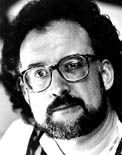1997 – Simon Bainbridge
An orchestral work inspired by the poems of a Holocaust survivor captured the 1997 award.
British composer Simon Bainbridge intertwined his music with the poetry of Auschwitz survivor Primo Levi in “Ad Ora Incerta — Four Orchestral Songs from Primo Levi,” which was selected from among 181 entries for the $150,000 Grawemeyer prize. The work was premiered in London March 29, 1995 by the BBC Symphony with Bainbridge conducting.
Written for solo mezzo-soprano, bassoon and orchestra, the work evokes haunting images of the concentration camps and of spirits broken by the ordeal the victims suffered. The poems were written in late 1945 and early 1946, only a few months after Levi was released from Auschwitz.
“In the fourth poem, ‘Buna,’ are the words, `Tired companion, I see you in my heart.’ The mezzo-soprano and bassoon soloists are companions throughout the work, both in a musical sense and a poetic sense,” said Paul Brink, chairman of the Grawemeyer music award committee.
“The working together is especially obvious in the second poem, where the soloists simultaneously mirror each other’s lines. The role of the orchestra is to establish the mood evoked by the poetry, such as the stark sounds of the second movement, `Sunset at Fossoli,’ and enhance the imagery, such as the fluttering sounds in the high woodwinds and strings in the first movement, `The Crow’s Song.'”
Bainbridge has, for the past 25 years, developed a list of critically acclaimed works, including “Fantasia for Double Orchestra” for the BBC Symphony Orchestra; “Double Concerto,” written for Nicholas Daniel and Joy Farrell and commissioned by the 1990 Cheltenham Festival; “Toccata for Orchestra” for the Birmingham Conservatoire; and “Landscape and Memory” for Michael Thompson and the London Sinfonietta.
Bainbridge currently holds teaching positions at the Guildhall School of Music and Drama and the Royal College of Music in London. Previously, he served as the Forman Fellow in Composition at Edinburgh University and composer in residence for Southern Arts, a council that funds the arts in southern England. He also worked with England’s National Theatre in the early 1980s.”


